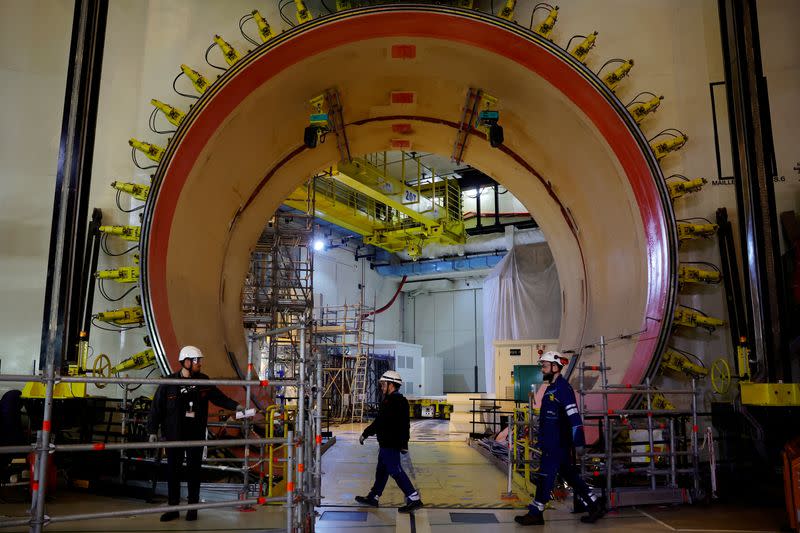EDF hopeful end in sight for long-delayed, budget-busting nuclear plant
By Benjamin Mallet
FLAMANVILLE, France (Reuters) - At a sprawling nuclear site in north western France, a banner next to a crane and a still-under-construction water reservoir confidently states: "Final stretch to get Flamanville 3 started safely and securely."
A decade behind schedule and billions over budget, France's nuclear-friendly government, its taxpayers, and power giant EDF - which is building the Flamanville next generation reactor - will be hoping nothing else goes wrong: the plant is expected to start producing electricity at the end of 2023.
"I feel today a buzz which is starting to show on the ground, with people seeing the home stretch. It's the final sprint and each week we feel this positive tension growing," said Alain Morvan, head of the Flamanville European Pressurised Reactor "EPR" project.
"I think it's good for the French industry and good for EDF that we finish a site that has faced problems," he told Reuters this week during a rare press trip to the plant.
Nestled at the bottom of a granite cliff in Normandy overlooking the English channel, the Flamanville 3 EPR project was designed to be EDF's flagship plant - a safer, more powerful and long-lasting nuclear reactor that would replace its ageing fleet and boost French nuclear exports.
But it has become a byword for its failings and an embarrassment for the government, which owns 84% of EDF and is banking on nuclear to blunt the impact of a European energy crisis worsened by the prospect of an abrupt exit from Russian gas.
Two weeks before Russia invaded Ukraine, President Emmanuel Macron announced a 52-billion euro ($54 billion) plan for EDF to build at least six new EPR reactors, placing nuclear power at the heart of France's drive for carbon neutrality while also boosting its energy security. France derived 69% of its electricity output from atomic power last year.
The Flamanville plant - which once fully operational will be producing enough power to keep a city like Paris going for a year - was originally expected to cost 3.3 billion euros and start operations in 2012.
It is now due to start loading fuel - one of the final stages before the start up of a plant - in the second quarter of 2023, and at the latest count the estimated cost had risen to 12.7 billion euros.
The delay is partly due to faulty welds in the reactor circuits and company officials said this week they were reasonably confident they could meet the latest deadline.
Of the 3,000 people currently working on the project, 800 are focused on fixing the welds - around 50 out of 122 still need repairing.
"I want to believe that we have analysed the situation well enough to avoid any further surprises," Morvan said.
European neighbours are also watching. EDF is building a new EPR plant in Britain, which has also been hit by delays and cost overruns. And France was the region's biggest net exporter of power last year, supplying countries such as Italy and Germany.
NATIONALISATION
That EDF officials are able to stick with the 2023 schedule set out in January for Flamanville, is one of the few pieces of positive news from the struggling power giant in several months.
EDF has faced a litany of problems this year, prompting the government to consider a full-blown nationalisation and de-listing of the company to have total control over a looming restructuring, possibly through a buyout of minority shareholders, sources have told Reuters.
Half of its nuclear reactors in France are offline partly due to corrosion problems, just as energy prices are soaring due to inflation, supply chain snags and the fallout from sanctions against Russia.
On top of that, the debt-laden group has been forced to buy power at record high prices and sell it on to its rivals for cheap, in line with a cap on energy tariffs set by the government to shield French consumers from climbing cost-of-living expenses.
EDF has already said it expects an 18.5-billion euro hit to its core profits this year due to production losses, on top of another 10.2 billion-euro loss from the energy price cap measures - a move the government is likely to repeat for next year.
A 3-billion euro capital increase - mostly funded by the state - was completed earlier this year. This week, Finance Minister Bruno Le Maire said all options were on the table for EDF when asked about a full-blown nationalisation, which gave its shares a rare boost.
"The general opinion on EDF is improving due to a series of positive signals and comments from French authorities on the growing potential of a nationalisation," said Nicolas Bouthors of AlphaValue.
"A buyback of minorities at a significant premium versus current value is once again attracting speculative interest from investors after they have abandoned the stock due to operational and regulatory issues."
($1 = 0.9630 euros)
(Additional reporting by Valentine Baldassari in Gdansk; Writing by Silvia Aloisi;Editing by Elaine Hardcastle)

 Yahoo Finance
Yahoo Finance 

